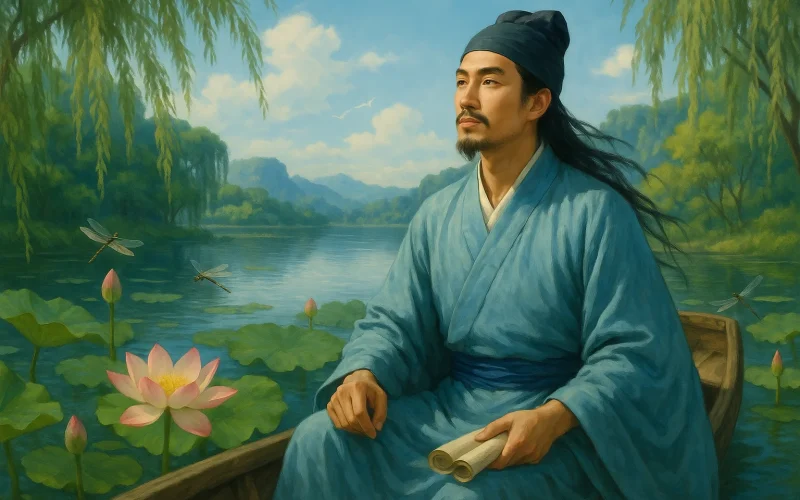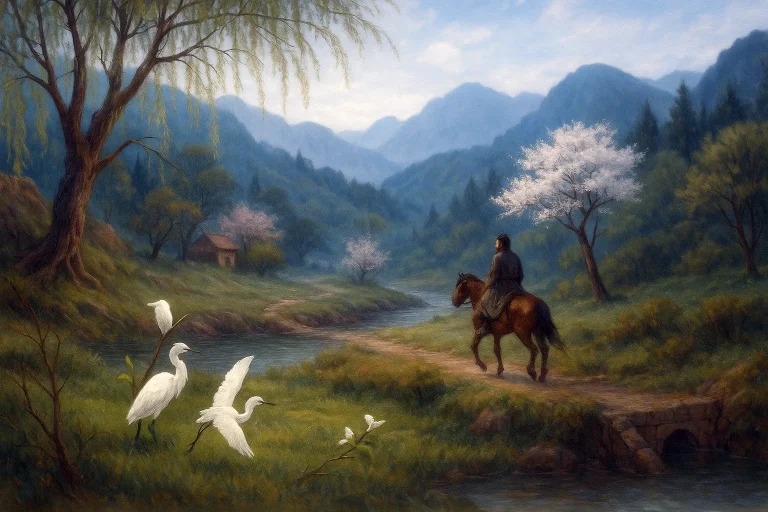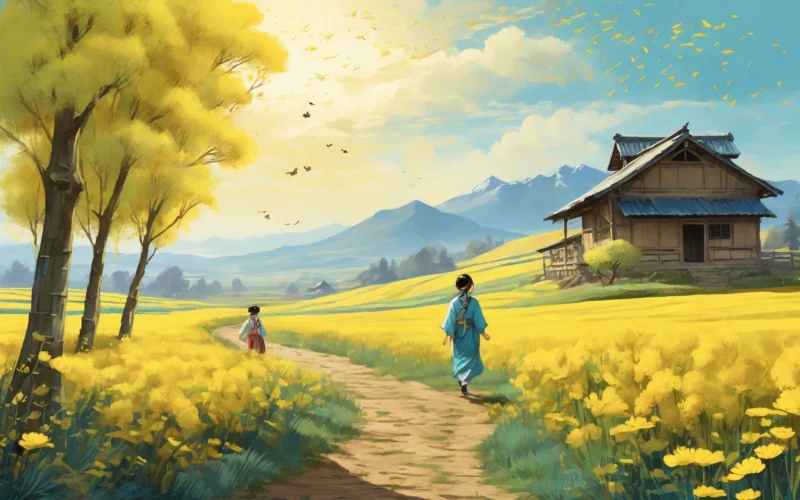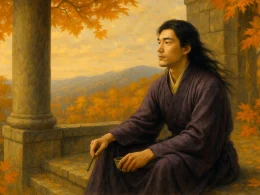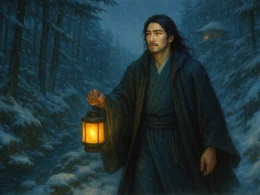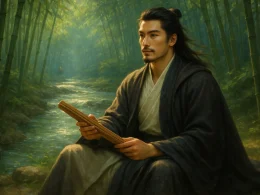Yang Wanli (杨万里 1127 - 1206), a native of Jishui in Jiangxi, was a renowned poet of the Southern Song Dynasty, celebrated as one of the "Four Great Masters of the Restoration" alongside Lu You, Fan Chengda, and You Mao. He attained the jinshi degree in 1154 and rose to the position of Academician of the Baomo Pavilion. Breaking free from the constraints of the Jiangxi School of Poetry, he pioneered the lively and natural "Chengzhai Style," advocating for learning from nature and employing plain yet profound language. His poetry, often drawing inspiration from everyday life, profoundly influenced later schools of lyrical expression, particularly the Xingling (Spirit and Sensibility) School.
Major Works
Life
Born in the year following the Jingkang Incident (1127), Yang Wanli grew up in poverty under the tutelage of his father, Yang Fu, a village schoolteacher. At fourteen, he studied under Wang Tinggui, a poet persecuted for his writings. In his Preface to the Jianghu Collection, Yang confessed that he initially "studied the styles of Chen Shidao and later Huang Tingjian," laying a foundation in the Jiangxi School tradition. After earning the jinshi degree in 1154, he met the anti-Jin statesman Zhang Jun in 1163, who imparted to him the Confucian ideal of "rectifying the mind and cultivating sincerity." This encounter marked a turning point in Yang’s thought and poetic style, leading him to adopt the sobriquet "Chengzhai" (Sincerity Studio).
In 1170, as a National Academy Scholar, Yang submitted the Thirty Strategies of Profound Deliberation, outlining plans for reclaiming the Central Plains, showcasing his political vision. During the Chunxi reign, his satirical elegy for Chancellor Yu Yunwen—"The grand ancestral temple mourns the death of a state elder; / Alone by the Yangtze, white-haired, I grieve in solitude"—angered powerful courtiers, resulting in his demotion. After retiring to Jishui in 1194, he built the "Chengzhai" cottage, entering his most prolific creative period. In 1206, upon hearing of Han Tuozhou’s reckless northern campaign, Yang died of indignation, leaving behind a final lament: "No path remains to serve my country; / Only unyielding loyalty endures."
Literary Achievements
Poetry
Yang democratized poetic themes, breaking from literati traditions. Song of Transplanting Rice Seedlings depicts farm labor with stark realism: "Husbands toss seedlings, wives catch; / Eldest plants while youngest uproots." Lodging at Xushi’s Inn in Xinshi captures childhood whimsy: "Children chase yellow butterflies— / Vanished amid rapeseed blooms."
His scientific observation revolutionized Song poetry. The Little Pond immortalizes ecological minutiae: "A spring’s silent mouth cherishes trickling streams; / Tree shadows caress water, loving sunlit softness." Farewell to Lin Zifang at Dawn, Leaving Jingci Temple reimagines West Lake through vivid contrast: "Lotus leaves stretch endlessly—emerald meeting sky; / Blossoms glow uniquely red under the sun."
Colloquial language upended classical decorum. Morning Meal at Songyuan’s Qi Inn blends street wisdom with philosophy: "Don’t claim downhill walks lack hardship— / You’ll fool wayfarers with hollow joy." Drizzling Rain personifies weather: "Rain comes thin and sparse, / Scant yet persistent."
Artistic Breakthroughs:
- Vivid Sketching: In Noontime Nap in Early Summer, synesthesia merges taste and sight: "Plums leave teeth aching with tartness; / Banana leaves share green with window gauze."
- Unfettered Imagination: Crossing Baoying’s New Lake exaggerates ecstatically: "Lake dyes three thousand acres jade; / Willows toss ten thousand golden strands."
- Inverted Tension: Seeking Coolness on a Summer Night rearranges syntax to amplify sensation: "Where bamboos deepen and cicadas chant, / Occasional coolness—not breeze—arrives."
- Paradoxical Diction: At Shatou contrasts surface and depth: "Secret tides go unnoticed— / Only boatmen read the water’s traces."
- Embodied Philosophy: The closing lines of Morning Meal at Songyuan’s Qi Inn transform struggle into landscape: "Trapped in ringed mountains— / One ridge yields, another blocks."
Theoretical System
Yang elevated Lü Benzhong’s "living method" (huofa), declaring in Preface to the Jingxi Collection: "Every mountain object is poetic." He rejected Jiangxi School dogmatism, asserting in Postscript to Xu Gongzhong’s Recent Poems: "I blush at sectarian mimicry— / True writers forge their own winds." His letter Reply to Lu Yibo proposed "observing principle through vitality," urging poetry to "transcend words and ideas" for ineffable resonance—a concept anticipating Yan Yu’s "wonderful enlightenment" theory.
Legacy
- Contemporary Impact: Lu You praised his "priceless artistry and impartial critique." Zhu Xi, while critiquing Yang’s Neo-Confucian gaps, lauded his "fresh and refined metrics." Disciples compiled his Retirement Collection, sparking a literary sensation.
- Yuan-Ming Reception: Yuan critic Fang Hui enshrined Yang’s verse in The Sea of Lyric Poetry as "unconstrained mastery." Ming scholar Hu Yinglin noted his evolution: "He took Lü Benzhong’s living method and surpassed it."
- Qing Canonization: The Siku Quanshu editors acknowledged his "departure from Jiangxi conventions to carve an original path." Late-Qing scholar Chen Yan ranked him with Lu You as a "pioneer of new frontiers."
- Modern Scholarship: Qian Zhongshu’s On Art hailed him as "a virtuoso of lifelike depiction." Zhou Ruchang’s Selected Poems of Yang Wanli explored his Neo-Confucian interplay. The 2021 Complete Song Poetry revision systematized his 4,200+ surviving works.
Yang’s 800-year-old tomb in Jishui became a Jiangxi Protected Site in 2006. The 2023 Chengzhai Memorial at Bailuzhou Academy recreates Song of Transplanting Rice Seedlings via holography. The 2017 Zhonghua Book Company edition Annotated Works of Yang Wanli compiles all extant texts, including rare prefaces from Japan’s Seikadō Bunko. This innovator—who etched "raindrops leaping like pearls on lotus leaves" into literary history—continues to ripple through Chinese poetry’s eternal currents.






